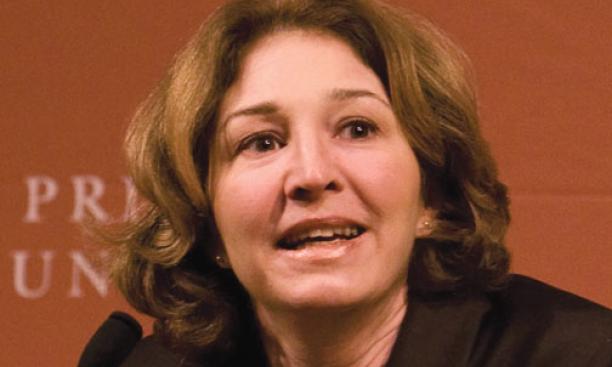

Anne-Marie Slaughter ’80, credited with revitalizing the Woodrow Wilson School since her arrival as dean in September 2002, stepped down as dean last month to join the Obama administration.
“Service seems far more a privilege than a duty,” Slaughter wrote Jan. 20 as she notified the school’s faculty she was resigning as dean and beginning a public-service leave as a faculty member. Her new job is chief of policy planning in the State Department, heading up an in-house “think tank” in a position that reports to Secretary of State Hillary Clinton.
President Tilghman praised Slaughter for “extraordinary leadership,” saying that during her 61/ 2 -year tenure “the reputation of the school as an academic powerhouse has been enhanced and broadened.”
Serving as interim dean during the search for Slaughter’s successor is Mark Watson, a professor of economics and public affairs whose research focuses on time-series econometrics and macroeconomic forecasting.
Slaughter was praised for increasing the size of the faculty from 66 to 82 and for the quality of her hires, especially in the field of international affairs; building new connections with other departments; adding five new research centers; expanding the MPP program to include doctors, lawyers, and Ph.Ds. from the sciences; attracting well-known policymakers for visiting teaching positions; supporting programs encouraging public-service careers, including the Scholars in the Nation’s Service Initiative; strengthening the undergraduate program; and bringing in millions of dollars through fundraising.
Mike McCurry ’76, White House spokesman in the Clinton administration and a member of the school’s advisory council, said Slaughter had restored “real respect for the role practitioners can play in the academic life of the Wilson School.”
She often was called upon to offer her views on issues of international law and foreign policy. She co-directed the Princeton Project on National Security, a 2 1/ 2 -year project that offered a blueprint for America’s role in the world in the 21st century, and she led a task force formed by former Secretary of State Condoleezza Rice on supporting democratic groups in other countries.
A Wilson School major and Sachs scholar at Princeton, Slaughter was hired at a time when the school’s international ranks had been depleted and the faculty “was quite dispirited,” said Stanley Katz, lecturer with the rank of professor who has been associated with the school for 27 years. He said she set a firm course that won broad support from both the faculty and Nassau Hall.
Two months before Slaughter began work as dean, members of the Robert-son family filed suit against the Univer-sity to challenge the workings of a foundation created in 1961 to oversee a $35 million family gift to support the Wilson School’s graduate program. The litigation was finally settled in Decem-ber 2008 after a long, acrimonious battle in which both sides spent tens of millions of dollars (see Notebook, Jan. 28, 2009).
Nolan McCarty, the school’s associate dean, said the most important aspect of Slaughter’s deanship “is that the school did not simply survive the litigation — indeed, the Woodrow Wilson School has prospered over the past 6 1/ 2 years.”
“Obviously, the biggest challenge and distraction during her tenure was the Robertson case, and she handled that very well,” said Joseph Nye ’58, former head of the Kennedy School of Government at Harvard.
Among the challenges facing the school’s next dean, McCarty said, will be maintaining a sense of “common intellectual community” as the school grows and adds new programs.
